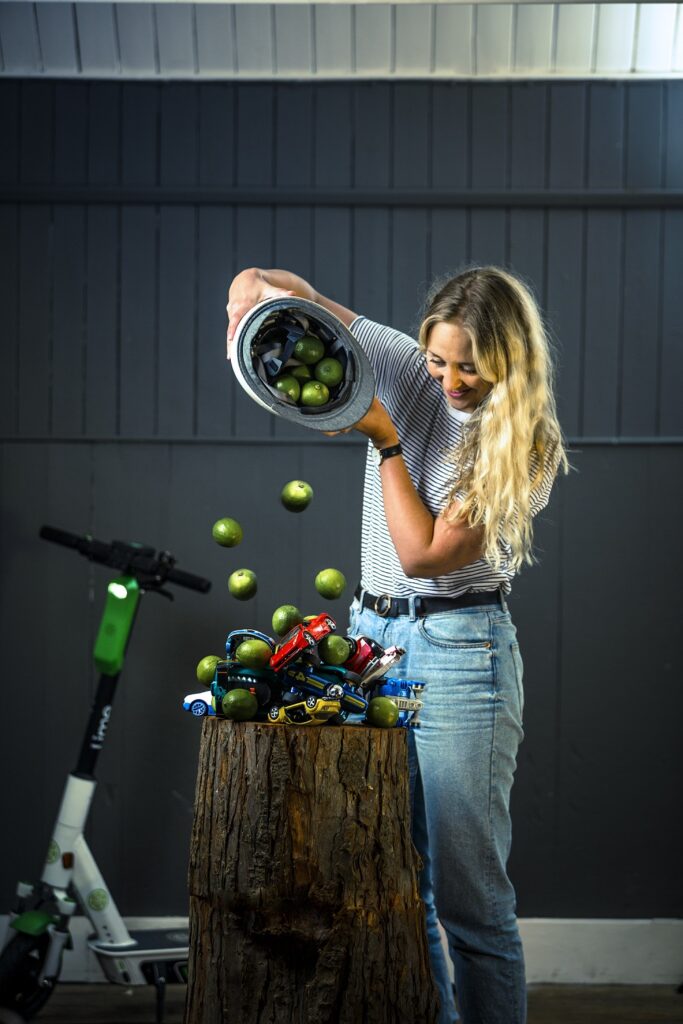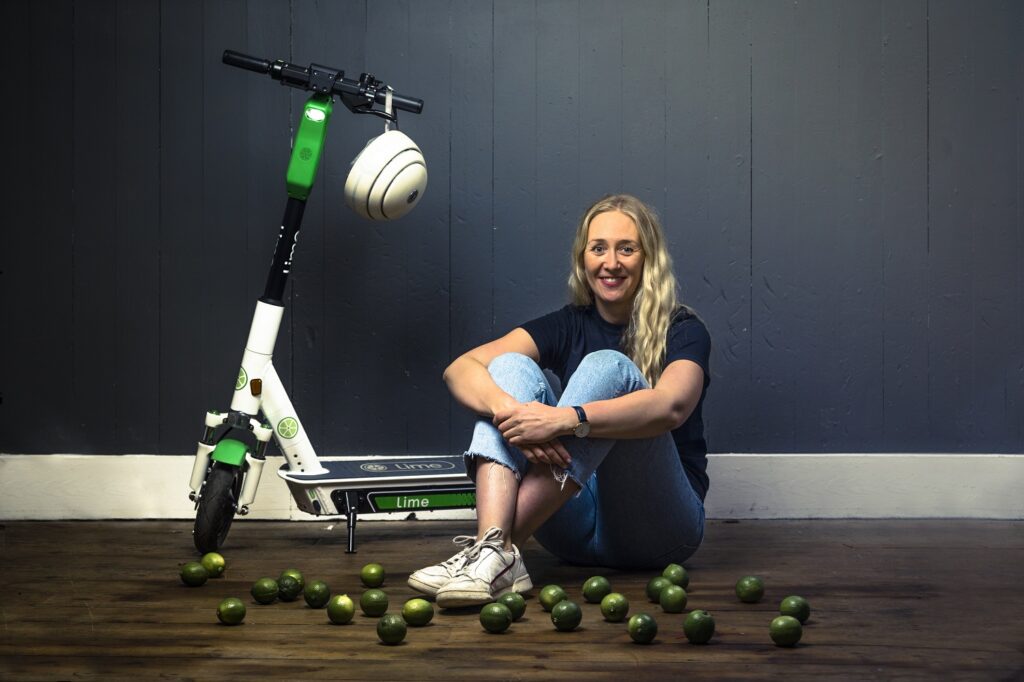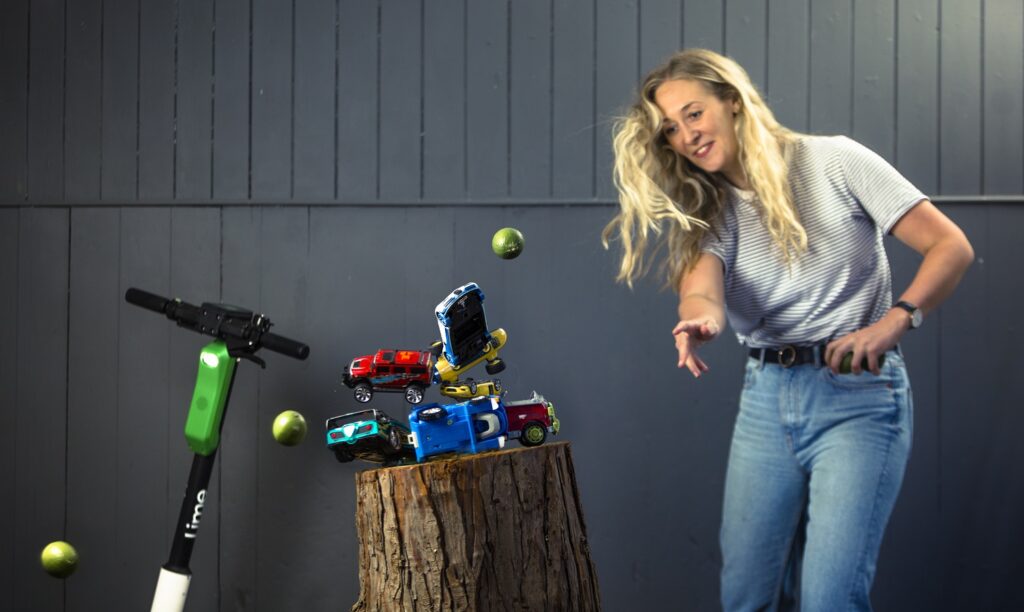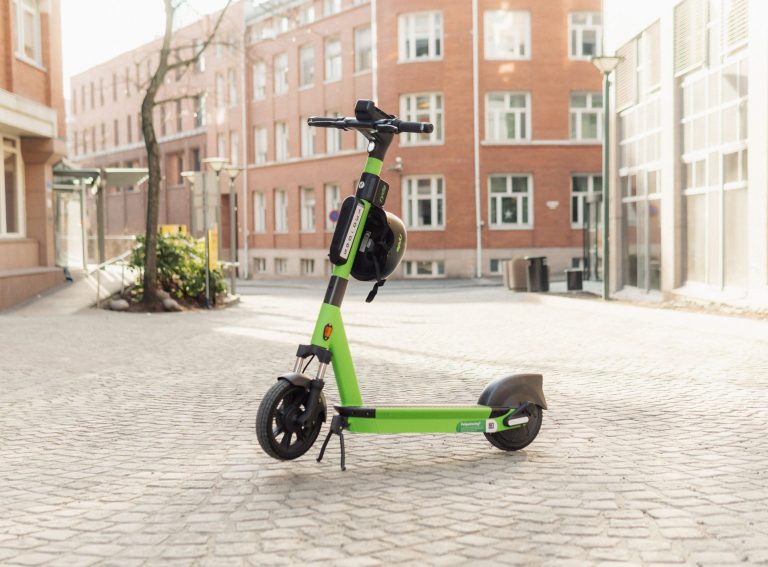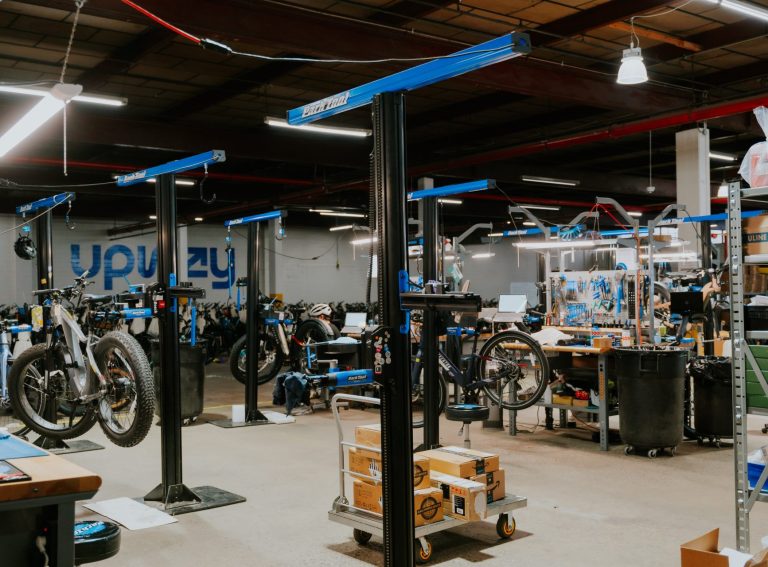Here’s some friendly advice: if you don’t want to feel like a ridiculous underachiever, don’t talk to Florence Milner. In fact, don’t even continue reading.
Before turning 30, Milner had already notched up a politics degree, an MBA and a series of high-flying positions at the third-largest insurance broker in the world, besides squeezing in time to volunteer at Age UK.
At 30, she was in full flight at Lime, overseeing all operations in Britain for one of the world’s most established and sizeable micromobility firms – after just a year in its employ – and creating powerful scooter converts, including the Prime Minister.
And Milner has only just turned 31. Told you not to read on.
But the shared e-scooter world is only a few years old, so Milner couldn’t have had her sights set on this path as a child in the same way that, say, surgeons or lawyers often do. No, Milner had to go in search of a calling, a mission, a sense of purpose – and she found it in micromobility.
Milner’s story starts in Ipswich, Suffolk, where she was born and raised (“and proud of it”).
“My parents were pretty environmentally conscious, particularly my mum,” says Milner. “I was very rarely in a car as a child. I walked to all of my activities or cycled. As I grew up, I saw how beneficial it is to your environment, health and mental health. That was strongly inbuilt in me.”
That environmental sensitivity followed Milner to her politics degree at the University of Nottingham where, she says, “I was the student washing out all my recycling and making sure I put stuff in the recycling bins!”
Milner felt at something of a loss after finishing her degree. She was searching for direction and hadn’t yet found it. She wondered, “What do I do with my life? I felt very jealous of the vets and the doctors who had decided when they were ten years old what they wanted to do.”
Insurance might not be the conventional answer, but that’s where Milner found herself. The giant, historic Willis Towers Watson became home for five years. Milner worked her way into positions as a project manager and trouble-shooter for markets across Europe, the Middle East and Africa, but to paraphrase U2, she still hadn’t found what she was looking for.
“I didn’t have the kind of fire inside of me,” she admits, looking back. “I was doing a lot of things outside work. I was volunteering. I did lots of CSR stuff at work. It got to the point where I thought, ‘Why am I doing all this extra stuff?’ It was making up for wanting to do something where I had more purpose. I did enjoy having that general view of the business; I enjoyed project management; I enjoyed the operations side. There were lots of things right in terms of job function: it was just the topic I was struggling with.”
A break followed. Milner used the time to study for an MBA at Henley Business School. “It was a useful and reflective year, to work out what was right and what was wrong – why was I not feeling satisfied,” she says.
And then, the stars aligned for the woman who’s never owned a car: bike-share and e-scooter fleet operator Lime posted a job vacancy.
The Woodstock festival of 1969 has become synonymous with the collective conscience of a generation angry and confused by the actions (and inaction) of world leaders. Today, micromobility has become a sort of Woodstock for a generation young enough to recognise the catastrophic consequences of climate change and old enough to have some measure of power for change. The climate emergency is this generation’s Vietnam, albeit at a larger scale; the fossil fuel-burning motor vehicles, its napalm; and the throngs of peaceful protestors and festival-goers, now millions of e-scooters riders.
“I’m of a generation – millennials – that has a real awareness of climate change,” says Milner. “And the younger generation is the most aware of climate issues. If you think about Greta Thunberg and all of the climate protests, that is something my generation was definitely not doing. I don’t know if it’s formally taught but children are very aware of climate change, so something’s getting through to them.”
Milner, the bright, bicycle-riding, blonde-haired idealist who fled the corporate world in search of purpose, could well have been a hippie if she’d been born more than half a century ago. She is easy-going and quick to smile and she’s passionate about making a better world for all. She’s even considerate of car users.
“Sometimes the problem is that people want to get out of their cars, but the other options aren’t that appealing,” she says. “My ideal would be to prioritise pedestrians, cyclists and scooters with robust infrastructure – making sure it’s segregated, spacious, and a really attractive proposition. It’s such a virtuous circle. We saw that with the lockdown. Suddenly, families were cycling around Parliament Square. You wouldn’t see that normally because it just doesn’t feel safe.”
A spell at that haven for cycling, the Netherlands, has also played its part in influencing Miner’s views. “While I was finishing my MBA, I heard about Lime,” she recounts. “I was very excited about what Lime was trying to do in terms of the sustainability agenda. I joined Lime at a point where it was exploding in growth, and I moved to Amsterdam. I think we had two European markets live when I started, so it was really, really early. And then I moved into strategy and project management, across the EMEA region largely. And then I ended up as the UK general manager, after just over a year at Lime.”
“Sometimes the problem is that people want to get out of their cars, but the other options aren’t that appealing.”
florence milner, lime
Lime got started as a bike-share business in 2017 before moving into shared e-scooters. In its short but complicated history, it’s attracted investment from the likes of Uber and Google, going on to hit a USD £2bn valuation in January 2019. In 2018, the company launched a bike-share programme in Milton Keynes and, a short time later, in London.
For some in the micromobility world, the involvement of any automotive firm in a shared mobility operator is Bad News. At best, they argue, it’s hypocritical; at worst, micromobility users actually become profit centres for businesses that are still merrily burning fossil fuels.
Lime comes under even more scrutiny thanks to its “gig economy” workforce, where recharging and fleet rebalancing activities are outsourced to the self-employed, who are paid per bike or scooter charged and who use their own motor vehicles in order to collect enough to make the job financially viable. It’s a very Uber-esque approach that Lime is beginning to move away from in some areas.
So has Milner “sold out” by joining the Silicon Valley start-up? She sees it a different way: “In my role, I work with cities to improve the urban environment, whether that’s being done with a bike or with an e-scooter. Looking at some of the stats, 60% of car journeys are three miles or less. The councils already know that. So how do we provide the best solutions for their residents and for these communities? What is a convenient, attractive, affordable, fun alternative to get people to make these changes?”
Lime, Milner argues, is the right platform.
“We’re live in 125 cities, in over 30 countries. That experience just can’t be replicated. We’ve managed to be successful in so many different types of market, whether it’s somewhere like Paris or Stockholm or even in some small towns in the US like Hoboken. What Lime has managed to do in our relatively short history is learn, iterate and improve. And that experience means we are a really good partner to cities, because we have this global pool of knowledge and learning. If you ever have a problem locally, you can tap into that; someone else is going to have had that issue before.”
And although e-scooter trials are new to the UK (Lime is running fleets in Milton Keynes and Salford), Lime is not new to the country, thanks to its bike-share programmes.
“We’ve been here for nearly two years now,” Milner says. “Not many companies have been able to stay in the UK. If you look at the London bike market, you can see that it’s not an easy market to operate in. We’ve been successful in doing that. We understand how to work with local authorities. We understand their challenges. We understand what keeps them awake at night. And that makes Lime outstanding.”
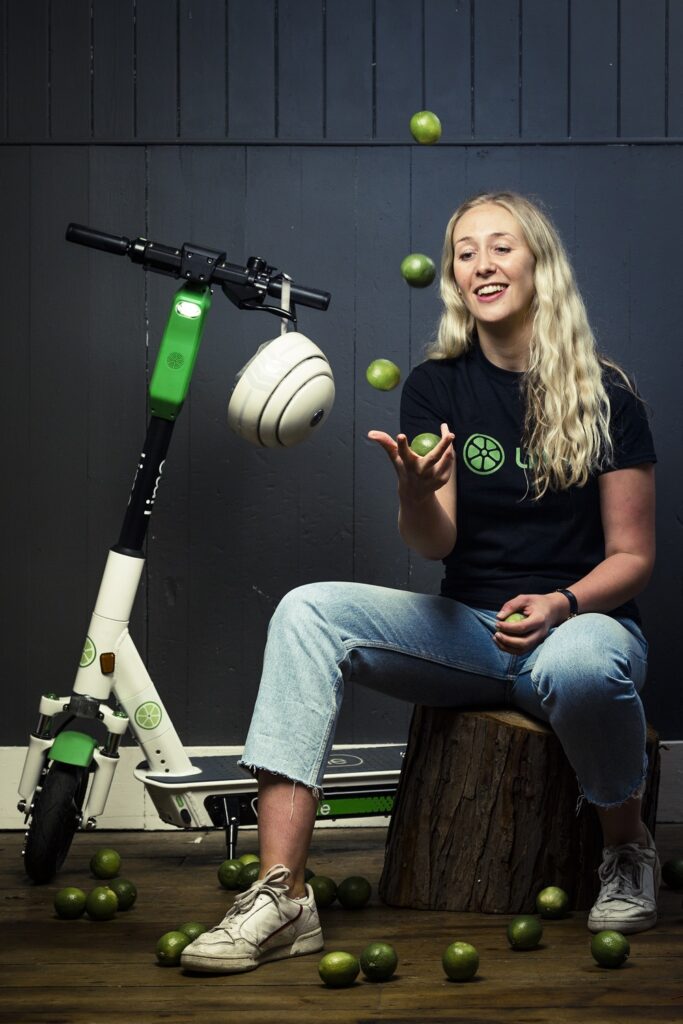
Lime began as bike-share provider before moving into e-scooters, and the company is now setting its sights much higher. It is creating an app which it hopes can bring all forms of micromobility services under one roof, including bikes from Jump and Wheels. This unique ability to look at different types of transport mode and type of customer gives Milner an excellent position to answer a question that has been dogging scooters for some time: do e-scooter journeys cannibalise bike rides?
“The demographic is wider with scooters,” Milner answers. “We tend to see a much bigger pool of people using the scooters. It’s actually different people. The Olympics did a great thing for cycling in the UK in many ways, but it did rather professionalise cycling and you see that a lot when you see people cycling around London. It is relatively male-dominated and there is quite a lot of lycra. It means some people just genuinely don’t identify themselves as a cyclist. We have the connotation of ‘I’m a cyclist’ or ‘I’m not a cyclist’. The great thing about e-scooters is that people don’t have those preconceptions.
“Because we have both modes in our app, we can see the cross-pollination between the two groups. So people who would never have tried a scooter or would never have tried a bike – suddenly they do.”
Milner also has found that riders don’t select e-scooters for the same purposes as bike riders: “People use scooters and bikes for different journeys. They choose the right vehicle for their journey, whether they’ve got a rucksack or a shopping bag or whatever it is. Scooters are preferred for slightly shorter journeys; bikes are preferred for slightly longer journeys.”
Milner is categoric when she states: “I don’t see cannibalisation. We see a widening of the pool.”
Like many e-scooter advocates, Milner is hoping that riders of the tiny two-wheelers will swell the chorus of voices demanding more appropriate and inclusive road space for all users, not just cars.
“We’re not taking people off their bikes onto scooters – we’re taking people out of cars for short journeys,” she says. “They’re seeing what the infrastructure is like, how it feels to be a user on the road that’s not in a car. I certainly think it will raise the conversation with a different group of people and I hope it will improve the infrastructure available across the UK.”
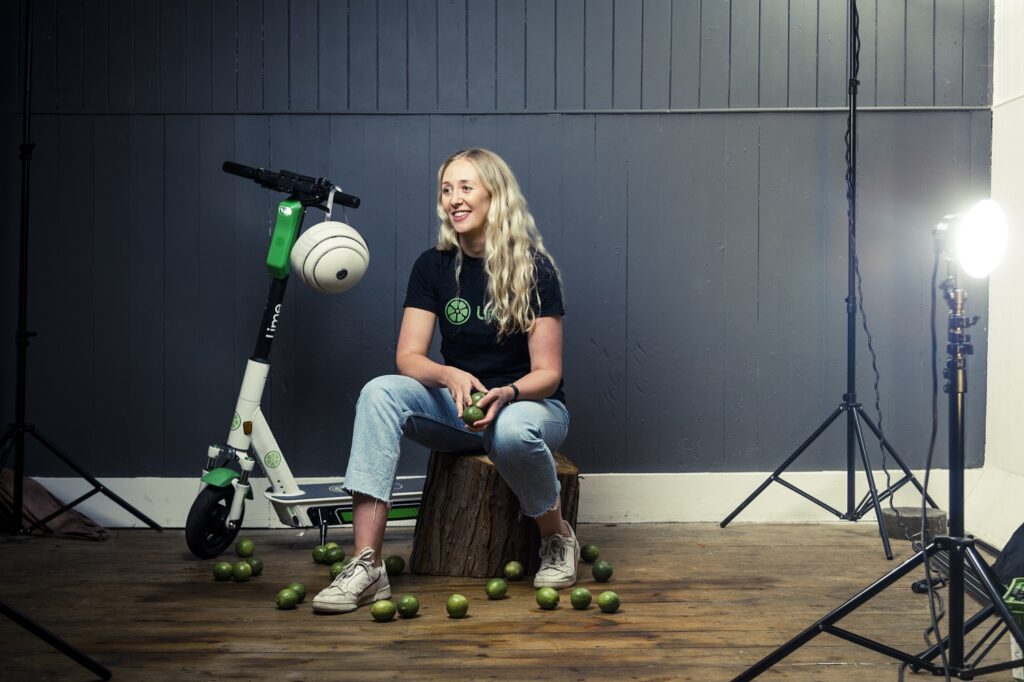
The micromobility companies bringing shared scooters to city streets often sound more like financial instruments rather than bona fide transport providers, with their fondness for shouting about venture capital and investment rounds. Milner is refreshingly pragmatic about the financial side of things, looking instead at the long-term business viability of micromobility in terms of what that means to communities.
“We’re focused on sustainability in all ways, and financial sustainability is one of those,” she says. “When we’re working with the boroughs, that’s something that we’re very upfront about: we are a private company, and we want to be here to serve the community long term. Being financially sustainable means we can stay and change modal habits in their boroughs.”
Milner points to other bike-share providers to illustrate her point. “Jump had the might of Uber behind them. Santander Cycles has TfL behind them. We have been absolutely driving for financial sustainability. We’re not making losses. We’re paying for ourselves, paying for our business. And that’s why we’re still here [in London]. Because we have learned, our team has learned.”
“In many ways, councils have in their minds what they want to achieve. With Lime, we are giving them options to make those changes.”
Florence milner, lime
Sticking around is going to be key for the UK e-scooter market, where it is already looking likely that trials will lead to permanent solutions. Milner is supportive of the way the DfT has gone about introducing the trial programmes.
“The fact that the UK is a little bit later means that we have got a lot of the positives,” she points out. “The UK has had time to look and learn and legislate accordingly. It’s meant the DfT has come up with a very robust framework. At Lime, we’ve always advocated for a stringent framework. For many people, an e-scooter is an e-scooter is an e-scooter. But we want everyone to uphold the same high standards that we hold ourselves to. The UK’s legislation demands that from everyone. So we’re happy to see that.”
Milner goes on: “The requirement for engagement with the councils is important. That isn’t necessarily something that has been true globally but it’s such an important part of making the trials successful and delivering modal shift and achieving the air quality agenda.”
Milner goes on to praise the ban on pavement riding and even applauds the (for some operators) contentious issue of insurance requirements. “It just makes sure that the schemes delivered are safe, and that they benefit everyone in society, not just the scooter users,” she observes.
As the e-scooter trials roll out, Milner is excited at the prospect of helping local authorities transform their urban spaces, through powerful data collection and sharing. “Here’s a load of data (anonymised, aggregated) that can tell you that here would be an amazing place to put some bike infrastructure because we see a lot of rides there,” she enthuses. “Or, have you thought about turning over this car space to micromobility parking? Because we see a huge amount of trips start and end here. In many ways, councils have in their minds what they want to achieve. With Lime, we are giving them options to make those changes.”
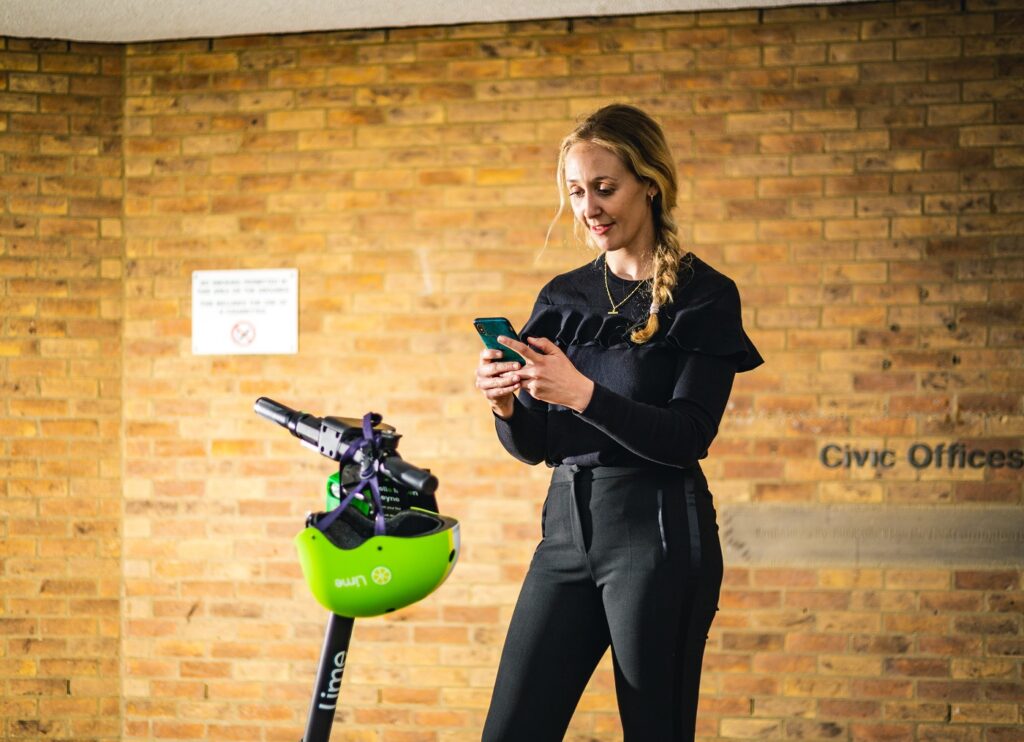
At 31, Milner is just getting started. She’s living on British soil again and is busy with Lime’s e-scooter trial programmes and bike-share schemes. And she’s ensuring there’s no dillydallying from Lime on meeting its ambitious targets to safeguard our planet.
“Zero emission is a great place to start but we do need to look at the whole lifecycle,” she says of her next chapter. “Charging is a huge element. In the UK, Lime uses Octopus Energy, so all of our scooters and bikes are powered by 100% renewable energy. We want to live the values were espousing. We are committed to sustainability and we want to make sure we embed that in every part of the business. It’s holding ourselves to account, making sure we look at the end-to-end proposition.”
Lime, for its part, is forging ahead, and recently announced a tie-up with the WWF designed to lead to more liveable cities while detonating Lime’s own carbon footprint.
E-scooters don’t just have ability to cut carbon and boost air quality. They can also be a powerful tool for redressing unequal and inequitable access to public transport, particularly across lower-income and ethnically diverse neighbourhoods.
Milner is very aware that, in order to properly serve all communities, micromobility companies themselves ought to reflect that diversity in a way that car makers and other transport firms do not.
“Lime has definitely held itself up and our board is very diverse,” she says. “We are focused on inclusivity of all types. That’s important to understanding our riders. If you have just one type of person leading our company, that doesn’t reflect our ridership. We want to make sure we’re thinking about all people. We think it’s a great solution for all ages, all genders and so on. We should embody that.”
Milner is herself another example of micromobility’s female leaders but she isn’t content to be a token figurehead. “It’s good to see that there are several female leaders across the space,” she says. “I’m an example – but it’s great that I’m not the only one.”
Lime e-scooter riders include Boris Johnson, whom Milner conducted on a tour of Lime’s Milton Keynes warehouse. How did the Prime Minister fare with e-scooters?
“Amazingly!” Milner laughs. “I mentioned fun earlier. We had a great time scooting. Boris was meant to be staying in the warehouse but he sort of broke the parameters and went out onto the road! He is definitely a convert.”
But Milner is not done yet: “The Queen’s next!”
With Milner’s spectacular set of achievements, we wouldn’t bet against it.
